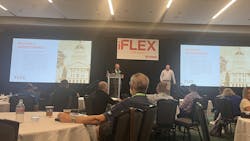Monday, May 13, marked the first set of sessions from the Preventative Automotive Maintenance Association at iFLEX 2024.
NOLN was there, and here is a condensed version of some session takeaways.
Government Affairs Update
Justin Cialella of Victory Lane Quick Oil Change led this overview of important topics that PAMA is keeping an eye on. Here are some of the many topical points from his presentation.
Cialella explained that a Right to Repair bill (specifically H.R. 906) would be the first major update to the Magnuson Moss Warranty Act, which was issued in the 1970s.
He said these days, some dealerships are even raising issues when they see that a customer went for service at an aftermarket service provider—the dealership will mark something provided during that service (such as an oil filter) as not "correct".
Cialella also highlighted how the EPA is currently pushing to label PFAS chemicals as hazardous. He mentioned that in general it is worthwhile to have spill prevention plans in place and to ensure that local state regulations and standards are being abided by.
In line with that, he spoke to how state laws can have certain classifications of repair facilities versus maintenance facilities. Shop owners should understand how their state classifies these differences, making sure that business practices are indeed aligned with what is happening at the shops, and what those shops are licensed for—otherwise there could be the potential of being pursued for fraud.
Matt Webb of Premier Oil Change jumped into the conversation to expand on this, saying that some states are even trying to expand the definition of fraud—meaning that it would be easier to enforce. He also provided insight on certain OSHA heat-related regulations and encouraged attendees to look at what their state requires and into a heat and illness prevention plan.
During the presentation, some other areas Cialella mentioned included:
- CDFA proposal that is in development to adopt NIST Handbook 130 for transmission fluid and engine oil, development of NCWM/API/SAE EV fluid requirements for labeling and receipt, and enforcement for state lubricant labels and receipt
- AOCA vs. CalEPA’s Department of Toxic Substances Control (DTSC) regarding fees on waste oil, which is currently in the appellate process
Navigating Uncertainty: What Does the 2024 Economic Crystal Ball Hold
Keith Prather of Armada Corporate Intelligence was the speaker for this economic deep dive.
He gave a high-level overview of some economic touchpoints from the Federal Reserve, such as the fact that the job market overall has 8.7 million jobs open and the normal is about 6 million. 62% of United States households are living check-to-check, and that statistic is 28% in higher earning households—encompassing around 78 million households all in the same boat.
Prather displayed a “K Shaped Recovery” wherein upper income households are doing well, 55% of “middle segment” households are living check-to-check, and 85% of lower income households are living check-to-check. He noted that those who fall into the latter category may have jobs that are more at risk of being automated—such as a cashier.
He also spoke about the concept of disposable personal income, and how when that gets tight you get deferred maintenance—such as choosing between paying for your kid's clothes and an oil change, for example.
Geo-politically, he said areas to keep tabs on include the Red Sea conflict, Ukraine, and the Spratly Islands (a region of the South China Sea that over 60% of the world's total trade moves through).
Overall, Prather does not have recession in the forecast right now and notes a growth at 6% this year from the GDP perspective.
Fueling Success: Comprehensive Training, Motivation, and Engagement Strategies for Oil Change Managers
Amber Kossak of Solid Start and Eric Frankenberger of Breeze Autocare (which includes the brands Oil Changers, The Wash Shop, and Oil Changers + Repair), led this session, which had takeaways inspired by both of their respective careers in this industry.
Frankenberger explained how a business model doesn’t run without people, with Kossak mentioning the importance of having the “right person in the right place at the right time.” This ties in not only to the people you are bringing on board, but also the job roles you are putting them into.
People are a valuable part of business, Kossak emphasized, and as a leader you may not be able to make everyone happy. Communication is an important aspect—it's not helpful to assume that everything is going fine—you need to be checking in with your team. Motivations for those doing the work may change, but at the end of the day it’s about building trust.
“Trust outweighs ability every time,” Kossak said.
Frankenberger spoke about how an employee with a high-ticket average and high trust is a no-brainer. Someone who has a high-ticket average and no trust is not; but someone you have high trust for who is at a lower performance is worth investing in as well.
In terms of effective motivation tactics for teams, Kossak listed trust, communication, listening to teams when they are communicating with you, and caring for your team. Frankenberger said there are usually two reasons why someone is working hard: they have respect for you, or they are scared for their job. Frankenberger doesn’t like that second one—noting that respect is what truly makes for a successful business.
Frankenberger and Kossak talked about processes as well, with Kossak using the example of someone who may be able to run fast, but if they don’t pass the baton the race will be lost. It’s a team sport mentality. Frankenberger said the best team members are the people who want a process in place to work within, and those who don’t want that are the employees you probably don’t want around.
Kossak emphasized the importance of consistency in training, and the incorporation of hands-on training as a crucial component. Frankenberger said giving people the opportunity to learn and improve is helpful, and if shop owners don’t have a good process in place they can reach out for support from others in the industry to learn from.
Kossak furthered this idea when talking about navigating challenges as a leader. Everyone faces challenges, either at work or in their personal lives, she noted. Reaching out to others can help. But despite challenges, leaders should keep their teams in the forefront of their minds.
Frankenberger talked about how leaders can face challenges as a “rock” or “sand.” A rock is solid and exacting in the face of adversity, while sand can be pliable and flexible when working through challenges.
Perspective plays a role in all of this, as well. Kossak highlighted how everyone has a different viewpoint and perspective—and as a leader, it doesn’t mean your perspective is necessarily the right one.
iFLEX runs May 13 – May 15 in Nashville, Tennessee.
About the Author
Hanna Bubser
Editor
Hanna Bubser is the editor of National Oil and Lube News and has been writing about the automotive aftermarket since 2022. She has a bachelor's degree in English from Hamline University in St. Paul, Minnesota. As a teenager, she drove a green 1996 Jeep Cherokee that was previously used as a forest service vehicle. Currently, she drives a 2019 Subaru Impreza. She's an avid bumper sticker collector and loves adorning her vehicle with brightly-colored conversation starters.

